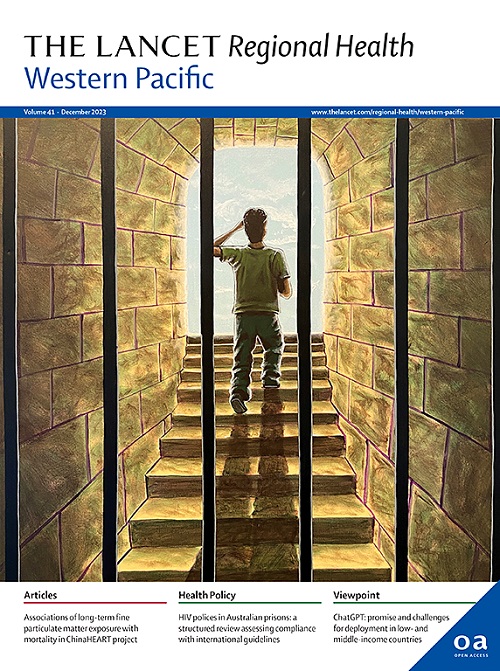开发和测试基于人工智能的语音生物标志物模型,以检测社区居住成年人的认知障碍:日本的一项横断面研究
IF 7.6
1区 医学
Q1 HEALTH CARE SCIENCES & SERVICES
引用次数: 0
摘要
语音是认知障碍的潜在生物标志物,因为轻度认知障碍(MCI)会导致语言模式和节奏的变化。人工智能(AI)可以提供语音生物标志物作为预测特征,从而及时、无创、经济地检测认知障碍。本研究旨在开发和测试利用语音生物标志物检测认知障碍的预测模型,该模型是人工智能从日本社区成年人的非结构化对话语音数据中提取的。方法本观察性研究采用横断面设计,纳入1461名社区居民。结果是通过MCI屏幕上的记忆表现指数评分来评估认知障碍。从3分钟的开放式访谈中收集语音数据,并使用语音生成器Wav2Vec2提取基于声学和韵律特征的语音生物标志物,作为单个语音信息的512维向量。其他重要的预测因素是年龄、性别和教育程度。采用极端梯度增强决策树算法和深度神经网络模型建立了979名参与者的认知障碍预测模型。在482名未用于模型开发的参与者中,通过曲线下面积(auc)测试了预测性能。结果:女性967例(66.2%),认知障碍526例(36.0%),平均(标准差)年龄为79.5(6.3)岁,受教育年限为11.6(2.2)岁。语音生物标志物的纳入显著改善了auc(95%置信区间),年龄性别模型的auc从0.80(0.76,0.84)到0.88(0.84,0.91),年龄性别和教育模型的auc从0.78(0.73,0.82)到0.89 (0.86,0.92)(p <;DeLong检验两种比较均为0.0001)。我们使用语音生物标志物的认知障碍预测模型可以提供显著节省时间的MCI筛查,预测性能高(AUC = 0.89)。语音生物标志物显著有助于提高预测性能。资助小企业创新研究(SBIR第三期基金)、国家脑和心血管中心心血管疾病校内研究基金以及JSPS KAKENHI。本文章由计算机程序翻译,如有差异,请以英文原文为准。
Developing and testing AI-based voice biomarker models to detect cognitive impairment among community dwelling adults: a cross-sectional study in Japan
Background
Voice is a potential biomarker of cognitive impairment because mild cognitive impairment (MCI) can cause changes in speech patterns and tempo. Artificial intelligence (AI) can deliver voice biomarkers as prediction features, leading to a timely, noninvasive, and cost-effective detection of cognitive impairment. This study aimed to develop and test prediction models utilizing voice biomarkers to detect cognitive impairment, which AI derived from voice data of unstructured conversations in community-dwelling adults in Japan.
Methods
This observational study with a cross-sectional design, included 1461 community-dwelling adults. The outcome was cognitive impairment assessed by the Memory Performance Index score from the MCI screen. Voice data was collected from 3-min open-question interviews and extracted voice biomarkers based on acoustic and prosodic features as a 512-dimensional vector of individual voice information using the voice generator, Wav2Vec2. Other considerable predictors were age, sex, and education. We developed cognitive impairment prediction models by applying the extreme gradient boosting decision tree algorithm and a deep neural network model using 979 participants. Prediction performances were tested by area under the curves (AUCs) in 482 participants who were not used for model development.
Findings
We had 967 women (66·2%), 526 cognitive impairment (36·0%) participants with mean (standard deviation) age and education years of 79·5 (6·3) years old and 11·6 (2·2) years, respectively. The inclusion of voice biomarkers significantly improved AUCs (95% confidence intervals), from 0·80 (0·76, 0·84) to 0·88 (0·84, 0·91) for the age sex model and from 0·78 (0·73, 0·82) to 0·89 (0·86, 0·92) for the age sex and education model (p < 0·0001 for both comparisons by DeLong test).
Interpretation
Our prediction models for cognitive impairment using voice biomarkers can provide significantly timesaving MCI screening with high prediction performances (AUC = 0·89). Voice biomarkers significantly contributed to improving prediction performance.
Funding
Small Business Innovation Research (SBIR Phase 3 Fund), the Intramural Research Fund of Cardiovascular Diseases of the National Cerebral and Cardiovascular Center, and JSPS KAKENHI.
求助全文
通过发布文献求助,成功后即可免费获取论文全文。
去求助
来源期刊

The Lancet Regional Health: Western Pacific
Medicine-Pediatrics, Perinatology and Child Health
CiteScore
8.80
自引率
2.80%
发文量
305
审稿时长
11 weeks
期刊介绍:
The Lancet Regional Health – Western Pacific, a gold open access journal, is an integral part of The Lancet's global initiative advocating for healthcare quality and access worldwide. It aims to advance clinical practice and health policy in the Western Pacific region, contributing to enhanced health outcomes. The journal publishes high-quality original research shedding light on clinical practice and health policy in the region. It also includes reviews, commentaries, and opinion pieces covering diverse regional health topics, such as infectious diseases, non-communicable diseases, child and adolescent health, maternal and reproductive health, aging health, mental health, the health workforce and systems, and health policy.
 求助内容:
求助内容: 应助结果提醒方式:
应助结果提醒方式:


